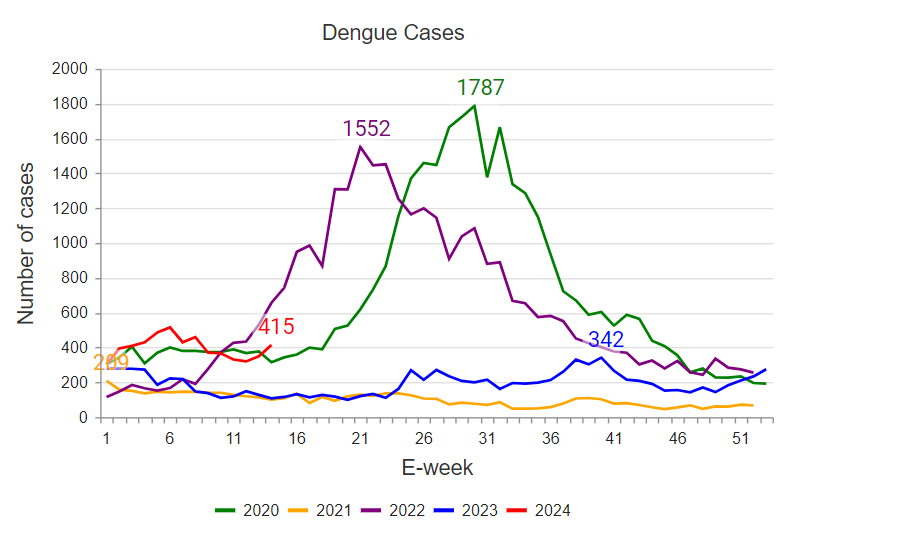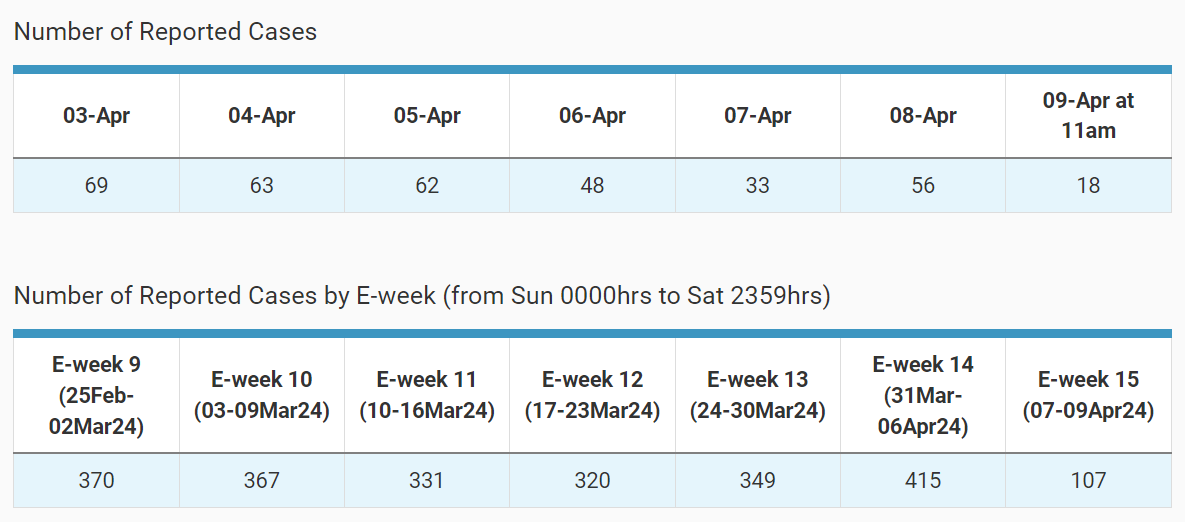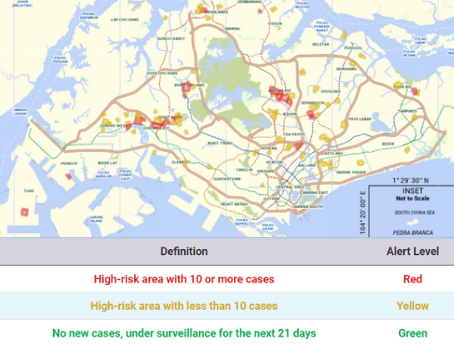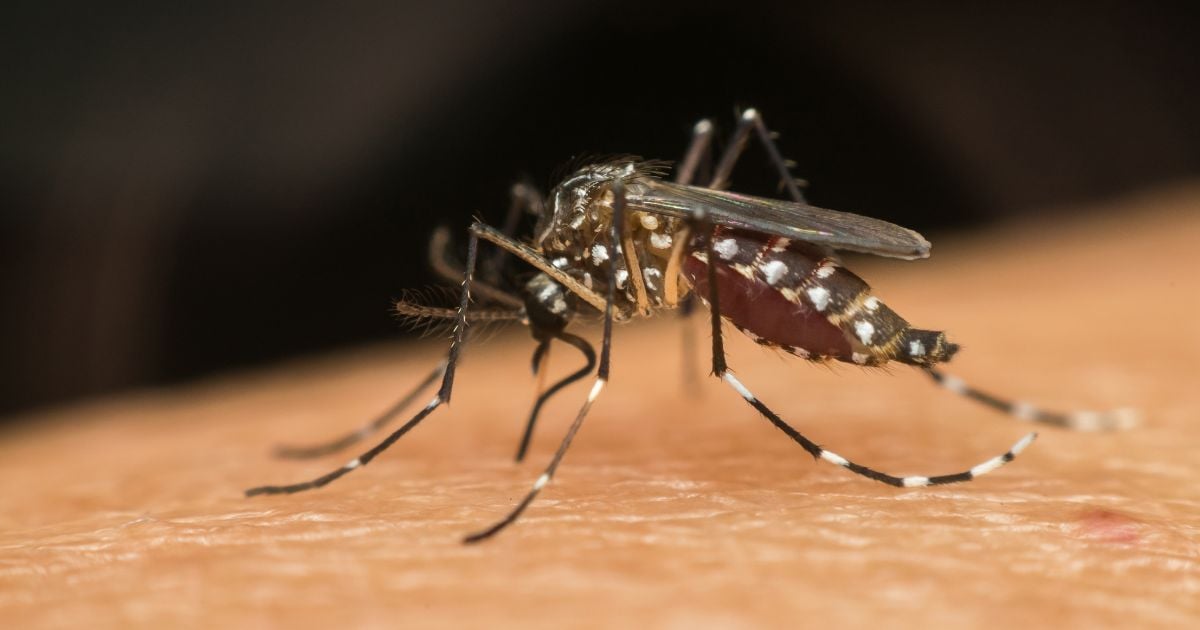It’s been really hot recently.
Like, REALLY HOT.

You can watch this video to know why it’s getting hotter in Singapore:
Not to be a nerd or anything, but when temperatures rise, enzyme activity increases and this causes the life cycle of mosquitoes to proceed faster.
Reader: Simi?
What I basically mean is that mosquitoes are now developing and reproducing at a faster rate.
And you know what else is happening at a faster rate?
Dengue Cases On The Rise In Singapore
In the week of 31 March to 6 April, the number of new dengue cases has hit 416. This is 67 more cases than in the previous week.
According to the National Environment Agency (NEA), over 5,500 people have contracted the infection in the first 14 weeks of 2024. Additionally, as at 25 March, seven people – most of them elderly – have died of dengue.
In 2023, the number of dengue cases stood at 9,949, and there were six deaths that year.
Although we’re just over three months into 2024, the number of dengue cases this year is already more than half of that last year, and there have been more deaths too.

According to the chart above, we’re seeing more dengue cases appear in the first quarter of this year than any other year. It seems dengue cases this year have shot up ahead of the traditional peak dengue season from May to October.
NEA said the weekly number of reported dengue cases has remained high, at above 300, since the start of 2024.

The agency also said that there are currently 90 active dengue clusters, of which 20 have 10 or more cases.
Several clusters where a fast rate of dengue transmission has been observed include a 118-case cluster in Ang Mo Kio Avenue 3 and Avenue 4, an 83-case cluster in Marsiling Road and Marsiling Rise, and a 53-case cluster in Gangsa Road.

There is a large population of Aedes aegypti mosquitoes (mosquitoes that can spread dengue) here. Given the low population immunity to all four dengue virus serotypes here, this may lead to a surge in dengue cases in the coming months if insufficient action is taken.
While the heat is one possible reason attributing to the increase in dengue cases the past quarter, NEA has also reported an increase in mosquito breeding sites, both in and outside of residences.
How Dengue Spreads
Dengue does not spread from person to person directly. Unless blood is involved, the infection is not transmitted by respiratory droplets, saliva, or sexual contact.
So, you don’t have to self-isolate like you did when you had COVID-19.
The dengue virus is primarily transmitted from person to person through the bite of an infected Aedes aegypti or Aedes albopictus mosquito.
These mosquitoes, otherwise known as the yellow fever mosquito and asian tiger mosquito respectively, are easily identifiable by the black and white pattern on their bodies and legs.

Male mosquitoes don’t bite humans or transmit diseases. They simply feed on plant juices such as nectar for survival and energy.
Female mosquitoes, on the other hand, need a blood meal to produce eggs as blood contains nutrients for egg production.
When an infected female mosquito bites a human for a blood meal, the human will contract the virus.
When an uninfected female mosquito bites a viremic human, meaning the virus is already in the human (from another mosquito), that uninfected mosquito will become infected, and will subsequently infect other humans when it bites them.
You can watch this video to know more about mosquitoes:
Just because you get bitten by a mosquito with a black and white pattern, it does not mean you have dengue. It is possible that the mosquito was uninfected, so you won’t contract the virus from it.
That being said, don’t be stupid let any mosquito bite you lah. The mosquito won’t come up to you and say “I’m not infected”, so you won’t have any way of telling if a mosquito carries the virus or not.
Also, nobody wants an itchy mosquito bite, dengue or not.
Symptoms suggestive of dengue infection include:
- Sudden onset of fever for two to seven days;
- Severe headache with retro-orbital (behind the eye) pain;
- Joint and muscle pain;
- Skin rashes;
- Nausea and vomiting;
- Bleeding from the nose or gums; and
- Easy bruising of the skin.
NEA advises persons showing symptoms suggestive of dengue to see a medical practitioner early, to be diagnosed and managed accordingly.
The agency notes that early diagnosis can facilitate better case management.
NEA also urges the public to remain vigilant and apply mosquito repellent regularly, even if one has already been infected.
This is to prevent mosquitoes from picking up the virus from an infected person before biting someone else, thus reducing further disease transmission.
NEA urges everyone in Singapore to play their part to prevent further localised disease transmission, through regularly practising the following Mozzie Wipeout “B-L-O-C-K” Steps:
- Break up hardened soil
- Lift and empty flowerpot plates
- Overturn pails and wipe their rims
- Change water in vases
- Keep roof gutters clear and place BTI insecticide inside
It’s important to prevent the spread of dengue, especially for those who have already been infected.
Those who have already been infected before have a higher chance of developing severe dengue when infected again.
Those who have symptoms of dengue fever also have about a one in 20 chance (5%) of it worsening to severe dengue.
Severe dengue is potentially fatal and is considered a medical emergency.
Warning signs of severe dengue include:
- Bleeding in the gums or nose, blood in urine or stools;
- Heavy menstrual bleeding;
- Severe abdominal pain;
- Persistent vomiting to the point that the patient cannot keep fluids down;
- Lethargy or change in alertness; and
- Breathlessness
